Papua New Guinea
Aitape to Wewak: A Tale of Bandits and Bush KnivesAitape to Wewak: A Tale of Bandits and Bush Knives
I awoke early in Aitape, northern Papua New Guinea, the day I travelled to Wewak, with no idea what to expect or how hair raising the day was going to be. That morning, Joseph, one of the sons of the family I was staying with, who was in his mid 20’s, and I went out to look for a reliable driver of a shared pickup to take me to Wewak. Wewak is the next town along the coast and the gateway to the fabled Sepik river region of Papua New Guinea, where local tribes hunt crocodiles in the river and worship their ancestors in ornately decorated spirit houses.
A reliable driver in this part of the world means someone who the family knows and who wouldn’t potentially shop me to bandits who would ambush the vehicle and rob me before we reached our destination. I’d also been warned by my host family in Vanimo the day before to avoid trucks carrying only men, for the same reason. Find one with women and children as well, was the advice, as they’re less likely to arrange an ambush.
We found a driver, Ismael, who was just getting ready to set off and said he would stop by the house once he’d found enough passengers to fill the tray of his Toyota Land Cruiser. The cost was 70 kina (€17.21/$20.38) and I could sit with him in the front! I then spent the morning hanging out with Joseph’s sister, Rayleen, in their kitchen, trying the fried dough pancakes she was making, and exploring the local beach with Joseph. Noting that the security situation in Wewak was not great with the words, “As Christmas approaches, people need money, so muggings go up”, Rayleen also kindly arranged for me to stay with a “reliable” friend of the family there.
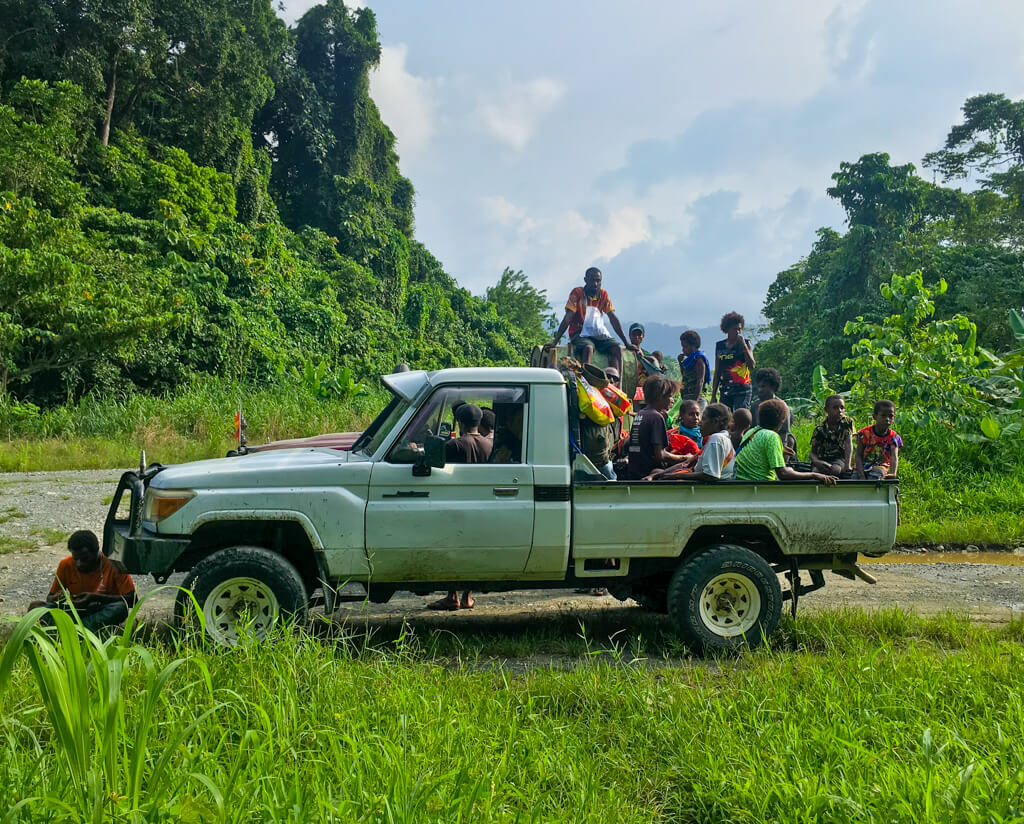
My ride to Wewak.
Around 11am, the pickup arrived and, taking my backpack with me in the front, I hauled myself up into the cab. I was surprised to see a 2ft machete (or bush knife, as the locals call it) on the inside of the door, but naively assumed it must just be carried out of habit, as I’d noticed a lot of the population in Papua New Guinea, including the two very friendly 20-something guys I’d been hanging out with in Vanimo, carried knifes of one kind of another by force of habit. If only I’d been right, a lady might have lived that day.
We drove around the village picking up a few other passengers and then stopped on the outskirts. I briefly met the wife of my host in Wewak and then chatted with Ismael, a friendly chap from Wewak who spoke very good English. We quickly moved on from smalltalk to the security situation. “Be very careful in Wewak town centre. Watch your pockets and be careful of groups of young men hanging around on the streets, especially if they’re drinking alcohol. People in Wewak are rough, it’s not like Aitape. Go out with a local if you can and don’t go out at night.” And as if that wasn’t enough to destroy the pleasant morning atmosphere in the warm Papuan sun, when I asked him why we were waiting, he told me, “We’re waiting for another pickup. A truck was ambushed on this road yesterday and the passengers’ wallets and phones stolen, so we’ll travel in convoy.”
Eventually, a second Land Cruiser arrived, this one maroon coloured and carrying empty oil barrels to be returned to Wewak, plus as many passengers as could sit beside and on top of them. It included some women and children, which was reassuring, as ours was all men – most of them young and carrying machetes.
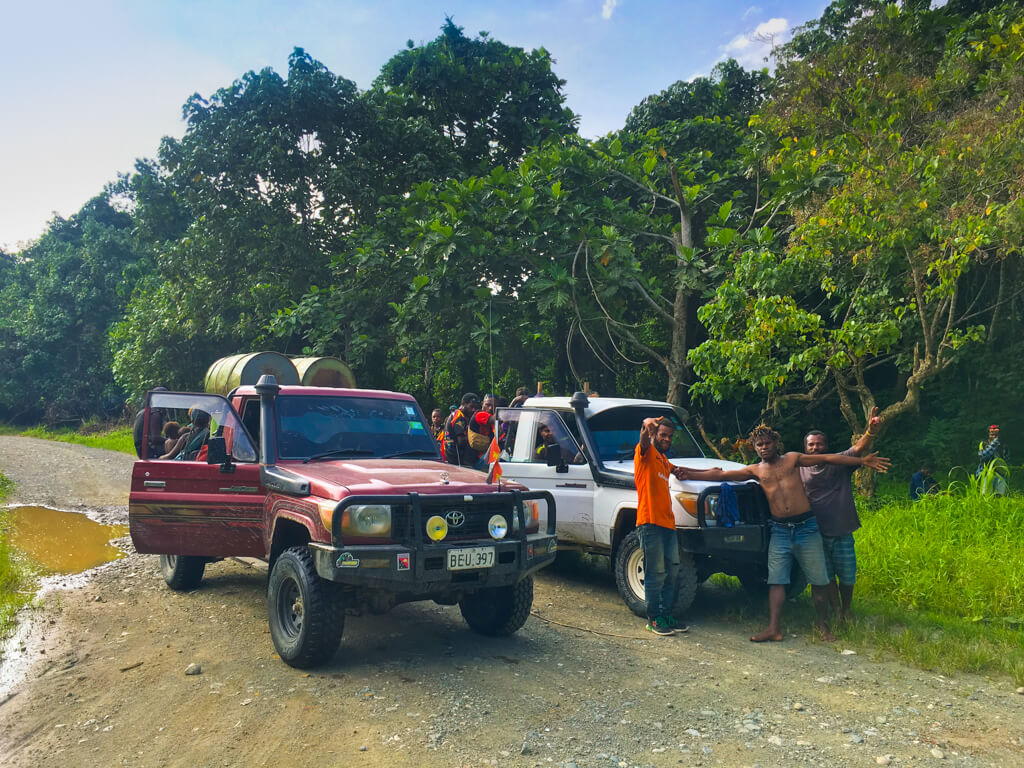
Our convoy, posing for the camera.
We set off through the lush jungle roads of Sandaun province (Pidgin for sundown, as it’s Papua New Guinea’s westernmost province), discussing this and that. Apparently, Sandaun was safe; it’s only after crossing the provincial border into East Sepik province that we needed to be concerned. Another man sat on the roof of the Land Cruiser’s cab (I have no idea how he hung on on the rough jungle roads), and a little while into the journey started passing cans of beer through the window to Ismeal. Drink driving is not considered an issue in Papua New Guinea. Ismael handed me one and I cracked it open. This was my first Papua New Guinean beer, South Pacific Export, a bitter but pleasant enough brew responsible for many of the local tribes’ problems. The artwork on the can was exquisite though. Papua New Guinea’s people are very proud of their culture and independence, and love colourful tribal-looking designs. I couldn’t keep the can, as I didn’t have space in my backpack for souvenirs, but I did take a couple of photos of it.
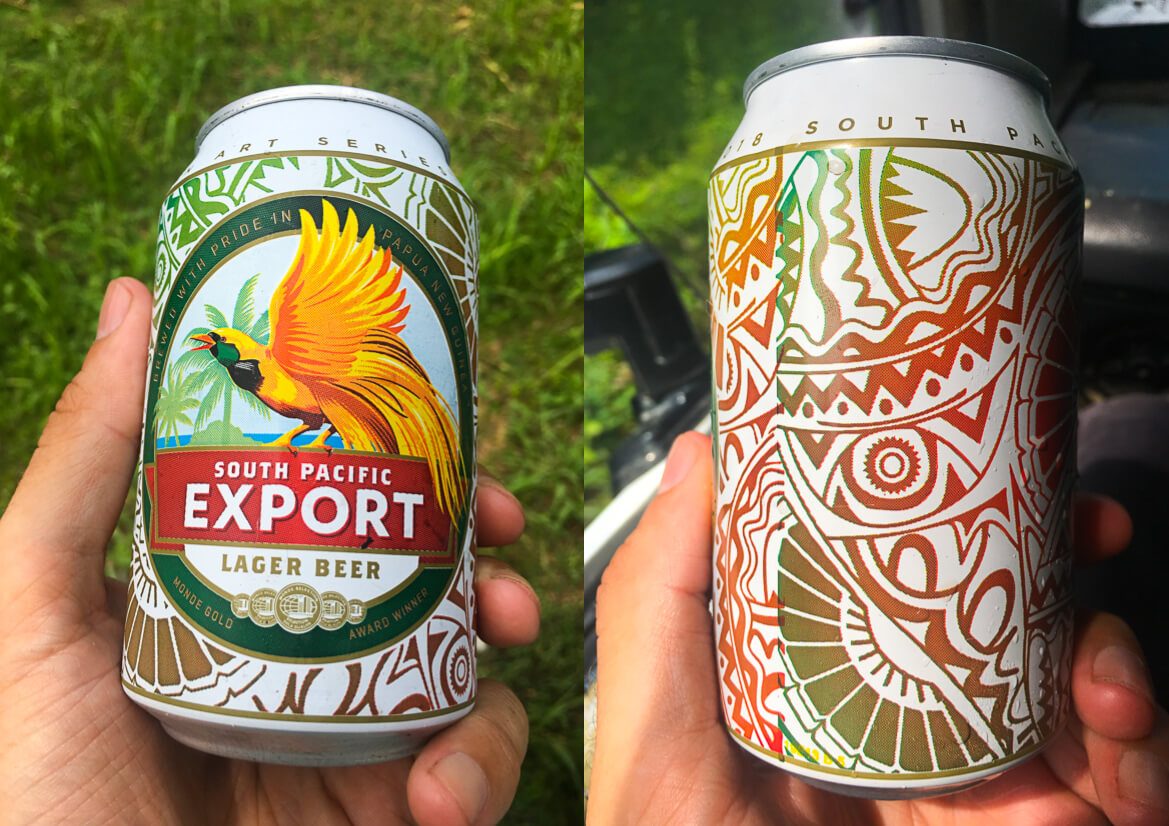
The beautiful beer cans of South Pacific Export. When I was there they had a special series with a different design for each province, all inspired by local customs.
By the time we stopped for lunch, the driver had already downed two cans of beer and had two more in the cab for later. You might think that being in a vehicle with the driver drinking that much would be cause for concern, but I soon realised this was the least of our worries. Lunch was delicious, as was all the food I had in Papua New Guinea. It consisted of five balls of sago, a jellylike staple extracted from the sago palm that is ubiquitous in lowland Papua New Guinea, with a piece of fried tuna, freshly caught from the sea, and some green vegetable. A lot more balanced than all the oily carbohydrate-rich food I’d been eating in Indonesia and Timor Leste the past few weeks!
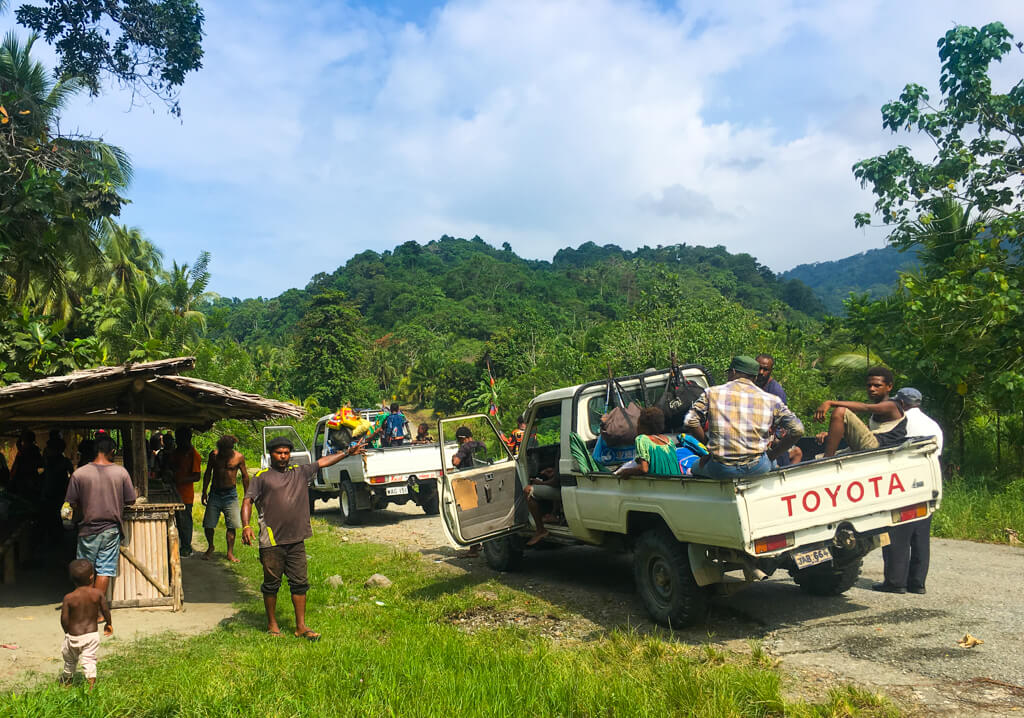
A roadside cafe, Papua New Guinea style.
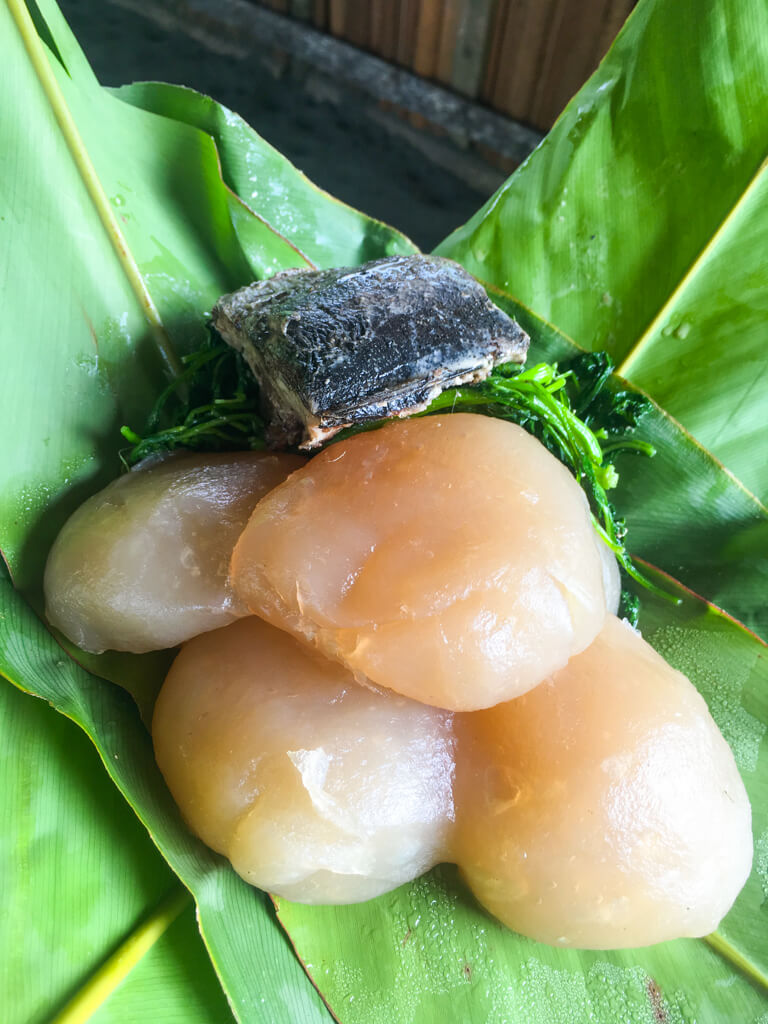
Lunch. It was delicious.
While we were eating, a pickup travelling in the opposite direction pulled up and the drivers chatted for a while in Pidgen, the local language. A car had been held up at gunpoint by some villagers a little further along the road and the occupants robbed. The good news though, was that this had happened on a section of the route where the road splits into two – a low road and a high road. The hold up was on the high road, which is in better condition, but we could still take the lower road to avoid the area. The driver of another pickup that had stopped for lunch, an Australian missionary, asked whether he could join our convoy in light of the news and we gladly accepted. Safety in numbers.
As we set off, my eyes came to rest again on the machete wedged in the pickup door. “Is that there for protection?”, I asked? “Of course,” Ismael replied, “and if we get ambushed, don’t hesitate to use it. The government won’t blame you if you maim or kill one of the raskols (the colloquial name for members of criminal gangs in Papua New Guinea), you’ll be doing the country a favour.” Looking at the two-foot blade and given that I’d never wielded any kind of knife before in my life, I couldn’t help thinking I was more likely to accidently maim myself than a raskol who’d probably been carrying a knife since he was five years old. “Don’t worry,” Ismael said, maybe seeing the wide-eyed look on my face, “all the boys in the pickups have blades and we have a couple of guns as well.” The idea of being caught in the middle of an all-out bush battle somehow didn’t make me feel much better. Giving them our wallets and phones and getting the hell out of there sounded like a better option to me.
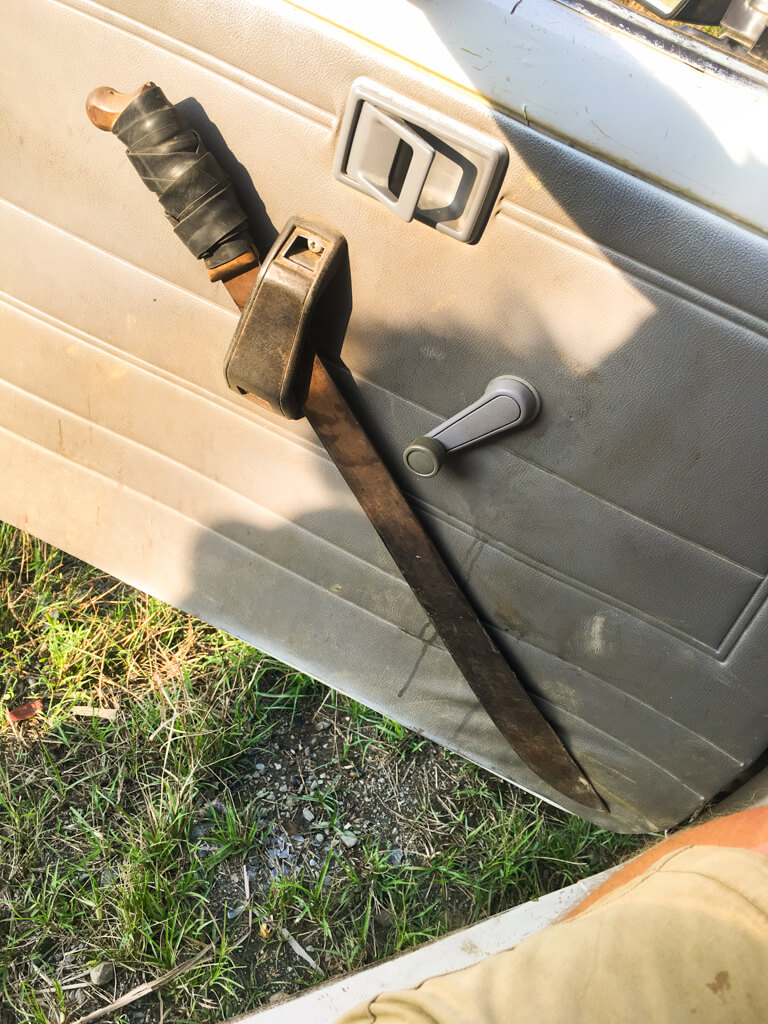
Just in case!
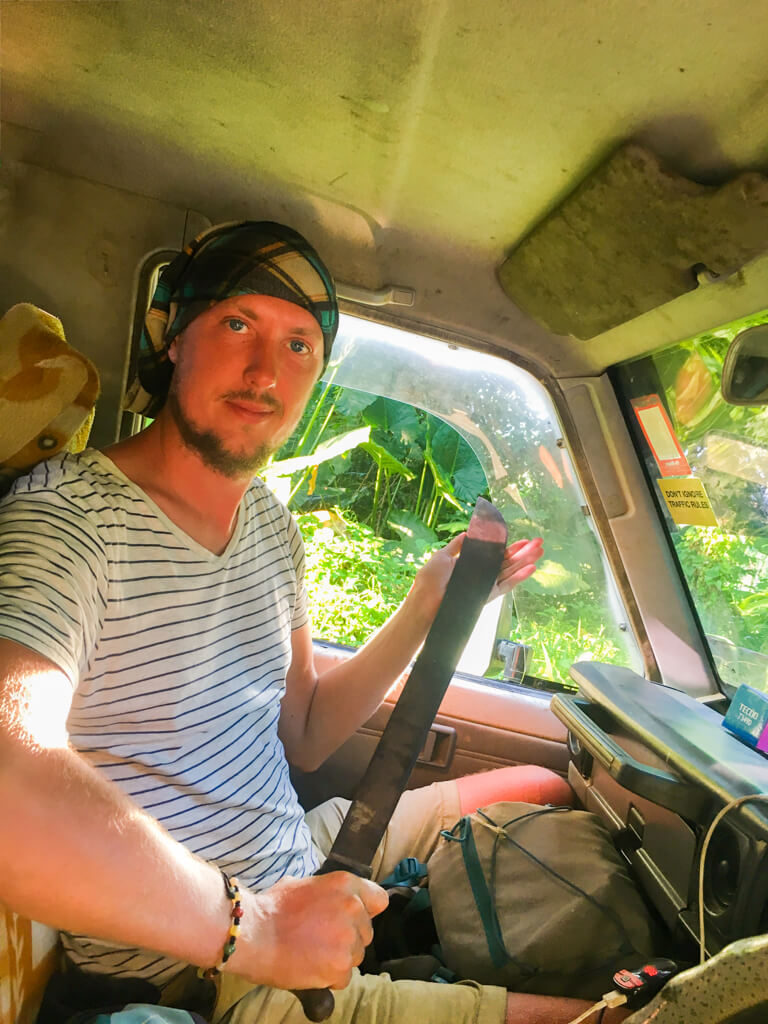
Don’t mess!
Just before we reached the border of East Sepik province, Ismael suddenly stopped the pickup on a hilltop, “This is one of the most scenic points on the route. Want to take some photos?”. I got out and snapped a few shots. The green of the dense jungle is really breaktaking, especially on this road, which periodically breaks through the dense foliage to reveal sweeping views of the coast. From the hilltop, I was able to see over a bay with a beautiful yet wild beach rolling into the distance in front of me. If this was to be my last day on earth, I might as well enjoy the view!
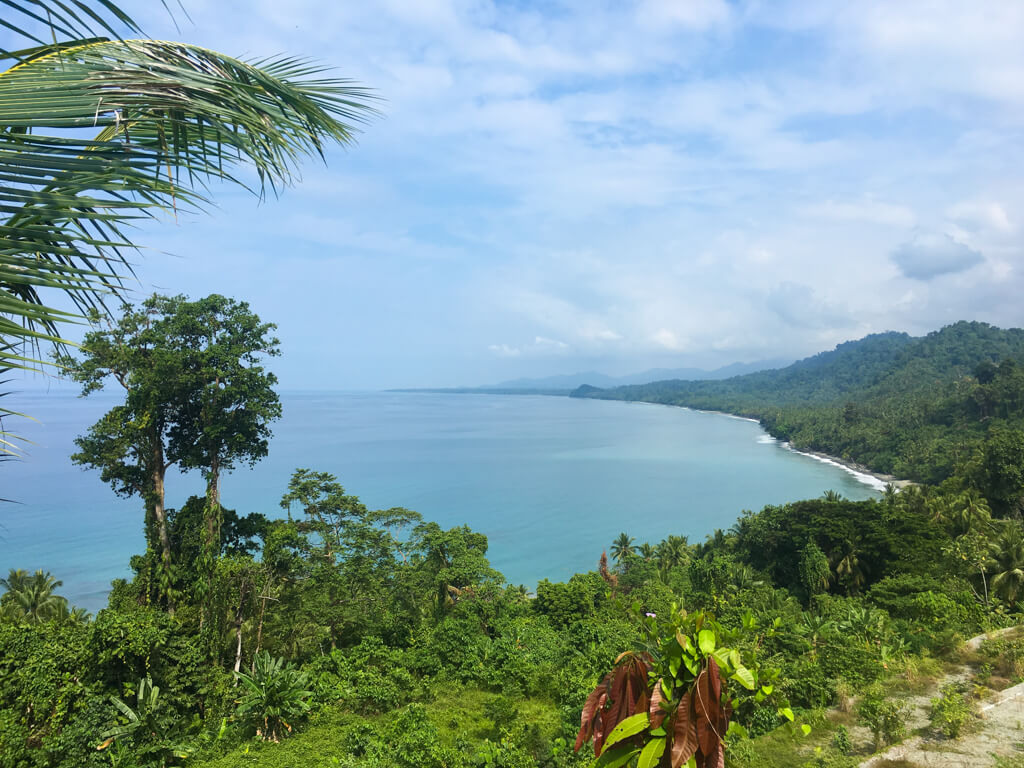
Remote and untouched – the north coast of Papua New Guinea.
We rolled over the border and soon reached the point where the road split into two. We took the low road, which was extremely rough. I could see why they use Land Cruisers for this journey; a normal car would not have been able to cut it. We crossed several fords, including one where the water was well over a foot deep. Another vehicle would have stalled or been washed away. Dense foliage higher than the Land Cruiser encroached on the road for much of the way, and I could easily see how it would be the perfect place for an ambush.
We peered right and left, looking for any signs of trouble ahead, although most of the road was so narrow that even if we had spotted something, we would have struggled to reverse the direction of the three Land Cruisers before they were upon us. After what seemed an eternity, we reached the point where the upper and lower roads converged again and stopped for a pee break and a sigh of relief. On a completely unrelated note, I saw one of the most beautiful and exotice insects I have ever seen in my life. It was just sitting there on a leave right in front of me while I was taking a leak.
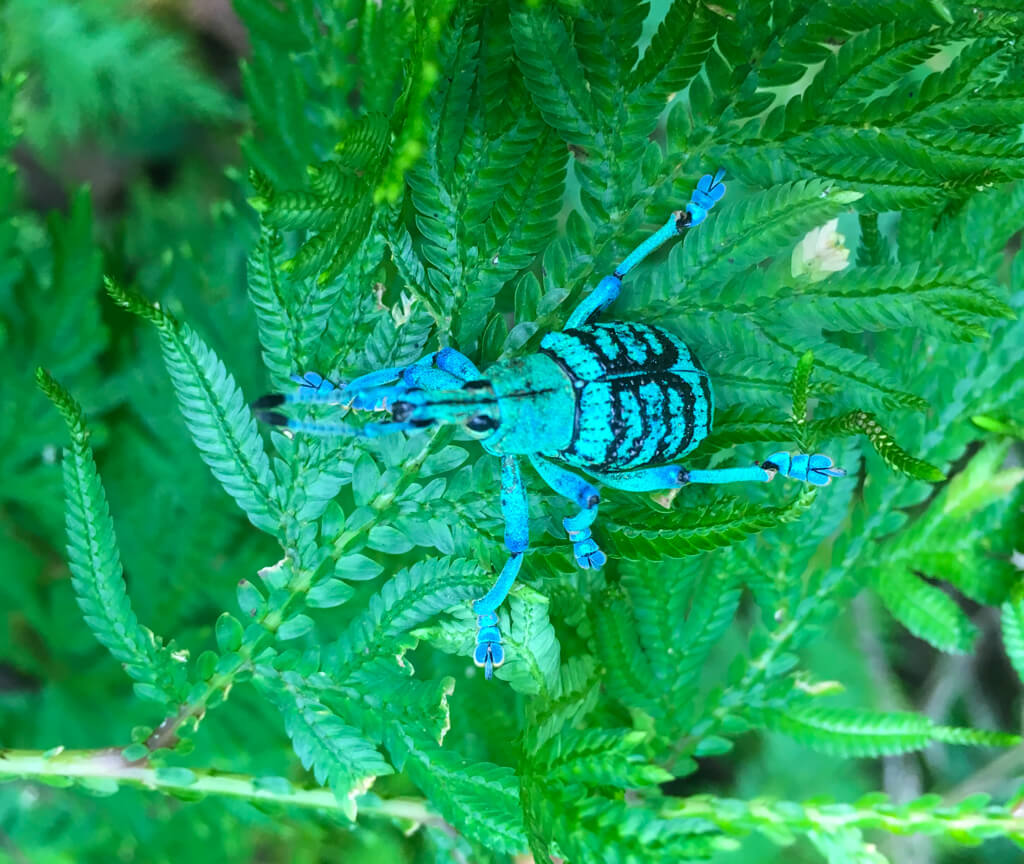
A blue weevil. Pity all my photos of it are slightly out of focus.
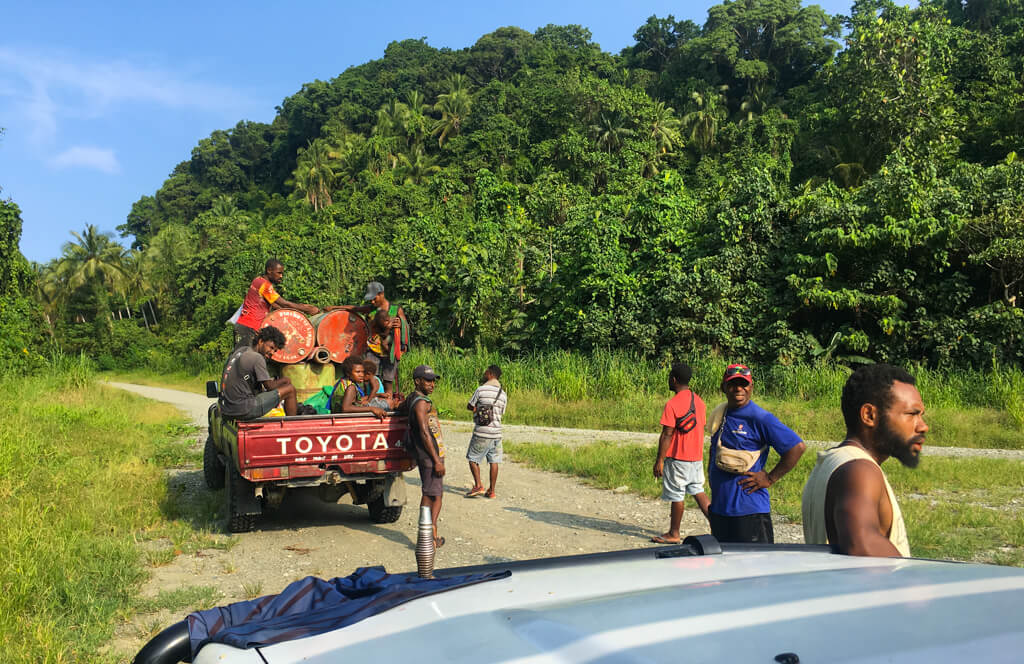
Taking a break to stretch our legs. As everywhere in Papua New Guinea, everyone I spoke with was very friendly.
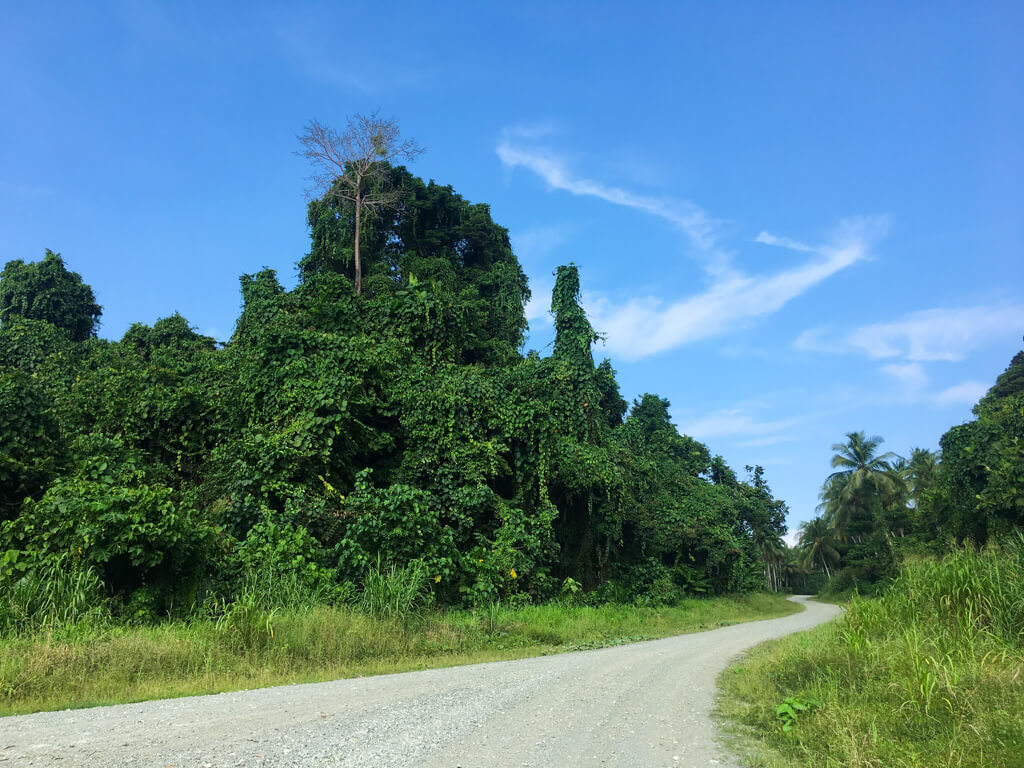
It’s hard to believe that deadly bandits could be hiding in such a beautiful place.
The relief at having passed the area of that morning’s hold up was short lived. Getting back into the vehicle, Ismael told me that we weren’t out of the woods yet. A little further on, we reached a section of road where a stream had changed course and ran down the middle of the road for a few hundred meters. The dirt road was extremely rough, narrow and it would be impossible, even in a Land Cruiser, to run away if we were ambushed here. “This is the worst section on the whole road from Aitape to Wewak for holds up,” Ismael announced tensely. We looked around nervously, but eventually the stream ended and the road widened out and became potholed tarmac again. A little further on we stopped to drop off a passenger and then crossed a bridge with a large log lying next to it. “There was a hold up here a couple of weeks ago. The Raskols placed that log across the road to stop the vehicle”, Ismael told me. I was amazed that no one had thought it a good idea to remove the log, so that it would be more difficult for the Raskols to stage a second hold up. Currently, all they would have to do was throw it back into the road from the side.
Finally, we reached the outskirts of Wewak. The whole journey had taken about five hours. Ismael kindly dropped me at the house where Rayleen’s friends lived, which looked a bit like a fortress, with a two-metre high metal fence around it, although the gate was not locked. I said goodbye to Ismael and went in. A man from Ambunti, a village on the Sepik river that I would visit later, welcomed me and introduced himself as Adrian. He was staying at the house while waiting for the owner, who was also the man who had kindly agreed to let me stay and who was currently away, to take him to Aitape, as he had no money for public transport.
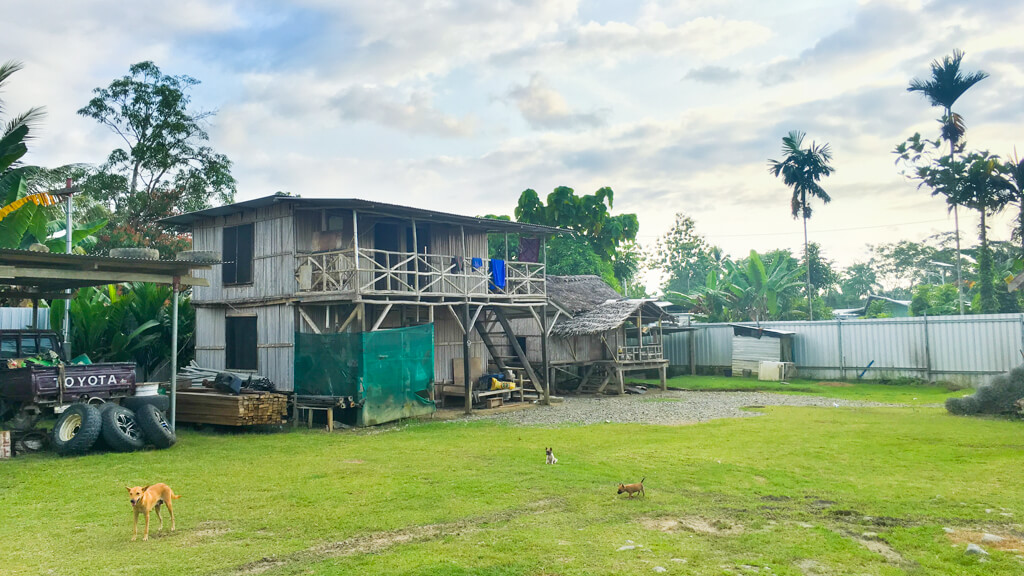
Luxury accommodation on the outskirts of Wewak – a two-story hut!
I took an almost instant dislike to Adrian, as within two minutes he was trying to sell me his brother’s services as a tour guide for later in my trip. He was the only person I had met so far who treated me like someone different. The other locals I’d stayed with were curious about my background and eager that I enjoy my stay in Papua New Guinea, but he kept repeating that I am “someone special and the people of Papua New Guinea have a lot of respect for you because you are white”, until I got quite annoyed and told him that we’re all people and actually no different.
Adrian did know the local situation well, though. He told me that during the hold up on the high road that day, something had gone wrong and a lady had been shot in the head. This was unusual, as usually bandits just steal people’s wallets and phones and let them go. The lady was from another village not far from Wewak and the local people were angry, so tensions were high and it was safest not to venture out into the town centre. And anyway, as many people had already told me, Wewak is not safe at night due to drunken muggings and violence. So that night I stayed in and, as there was no food, I went with him to the shop next door and bought some biscuits, which I shared with him and a boy who was looking after the house for the owner.
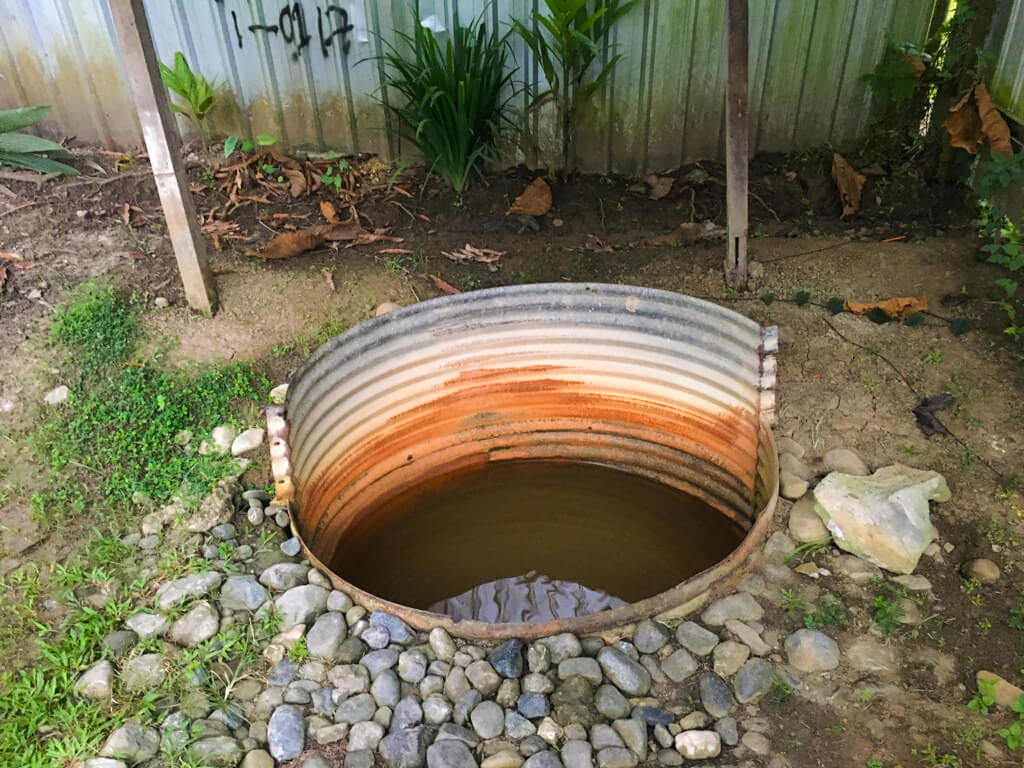
Taking a shower was a matter of getting water from the well to wash to wash with.
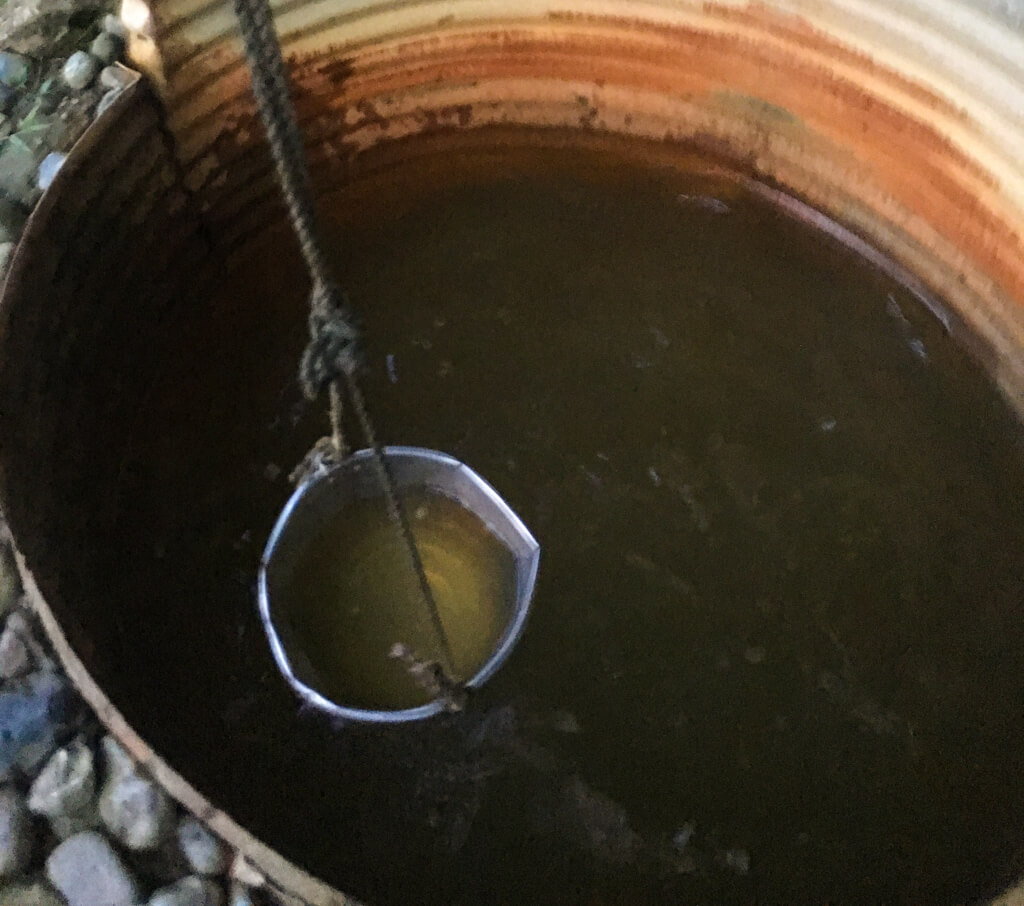
At least I knew there were no crocodiles in this water, unlike where I would be bathing in the Sepik river in a few days time.
The next morning, I got up and Adrian had made me instant noodles for breakfast, which I ate gratefully. I mentioned that I wanted to go into Wewak town centre, which was about 7 km away, and he said he would accompany me. We walked down the road a little from the house and passed a group of people hanging out under a large tree. A few waved or said Good Morning, so I waved back and greeted them in reply. Adrian said nothing. After we were out of earshot, Adrian asked whether I’d noticed that many of them were wearing long shorts. I said I hadn’t. “They have long bush knives hidden inside”, he said. “They are angry about the lady who was shot during the hold up yesterday, so they are waiting by the road to see if any cars from the village that carried it out arrive. If they do, they will attack them and kill the occupants.” As if to emphasize the point, a man suddenly walked past with his fist wrapped in a cloth. I didn’t think anything of it at first, but as he walked towards the group, I noticed that there was a blade several inches long protruding between his knuckles. Adrian was not kidding.
We took the bus into town and I paid Adrian’s bus fare, as he didn’t even have money for food (it was 1 kina – €0.24/$0.29). We spent an hour or so in town. I bought water, toothpaste, a few basic supplies, and a can of Fanta, plus one for Adrian. It was deliciously refreshing in the morning heat. The town was larger and had a much rougher grittier feel than the other two towns I had visited so far in Papua New Guinea (Vanimo and Aitape), and not in a good way. There was a tension in the air.
After visiting the supermarket, we wandered through an outdoor market on the waterfront and that was when I realised that Adrian actually did have some money, because he bought some betel nut. So no money for food, but enough to feed his betel nut habit. Oh well. At one point I walked towards the shore, where several boats were docked, intending to take a few photographs. “Come back,” Adrian suddenly called. He beckoned and I retreated. “There are men hanging around by the boats. It is not safe for you there,” he told me once we were further away.
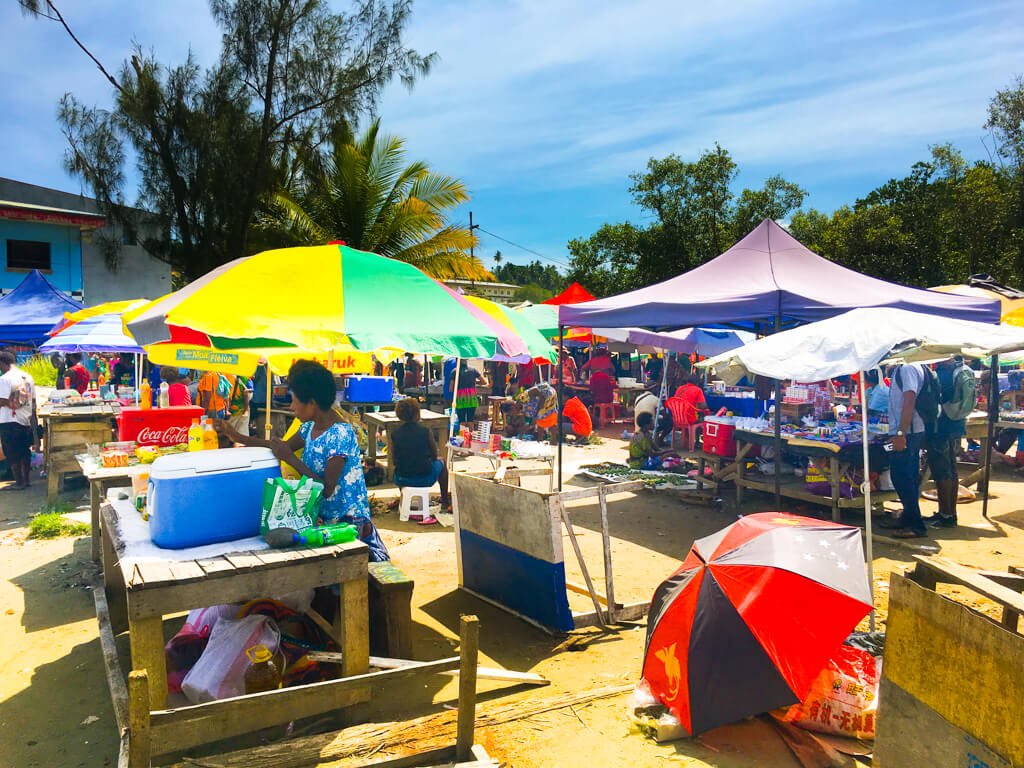
A colourful little market in Wewak.
On the bus journey back to the house, the very friendly bus driver let me and Adrian sit in the front so that I could see the view. I paid our bus fares again and Adrian chatted with the ticket seller to get an update on the security situation. The seller told us that the townspeople had gone to the police station to discuss the situation and might be going to the village with the police. The most likely outcome was that the villagers responsible would flee into the bush when they arrived and the police would burn down their houses, which are wooden huts. That seemed like a great recipe to incite further violence to me, but the police and army have a reputation for making things worse here. People often use their own means to deal with problems to avoid involving them.
I spent the afternoon working on my blog and in the evening Adrian and I walked down the street to a nearby group of market sellers to buy some food. The people were extremely friendly and, I think, pleasantly surprised to find a foreigner in their midst buying supper! I bought three dried fish and pieces of fried sago shaped like naan bread as dinner for all of us, for 2 kina each (€0.48/$0.58 – don’t listen to the blogs that say Papua New Guinea is expensive!). Then I came across a stall selling fried bugs. They were fat and squidgy looking, not exactly worms – I didn’t know what to call them, but a bit of Googling later showed that they were sago grubs. They grow fat eating the flesh of dead sago palms.
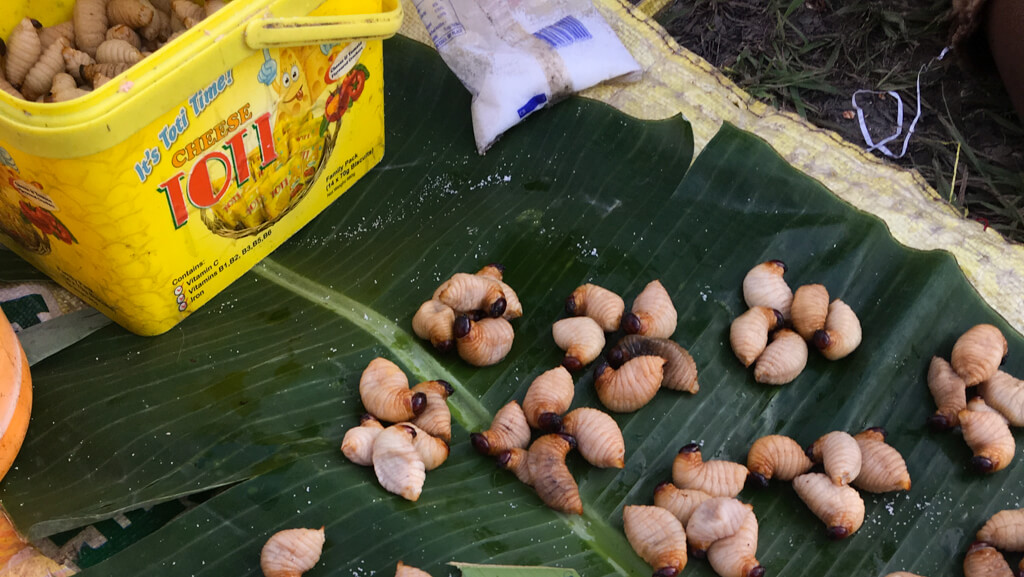
Yummy! At least these ones were dead.
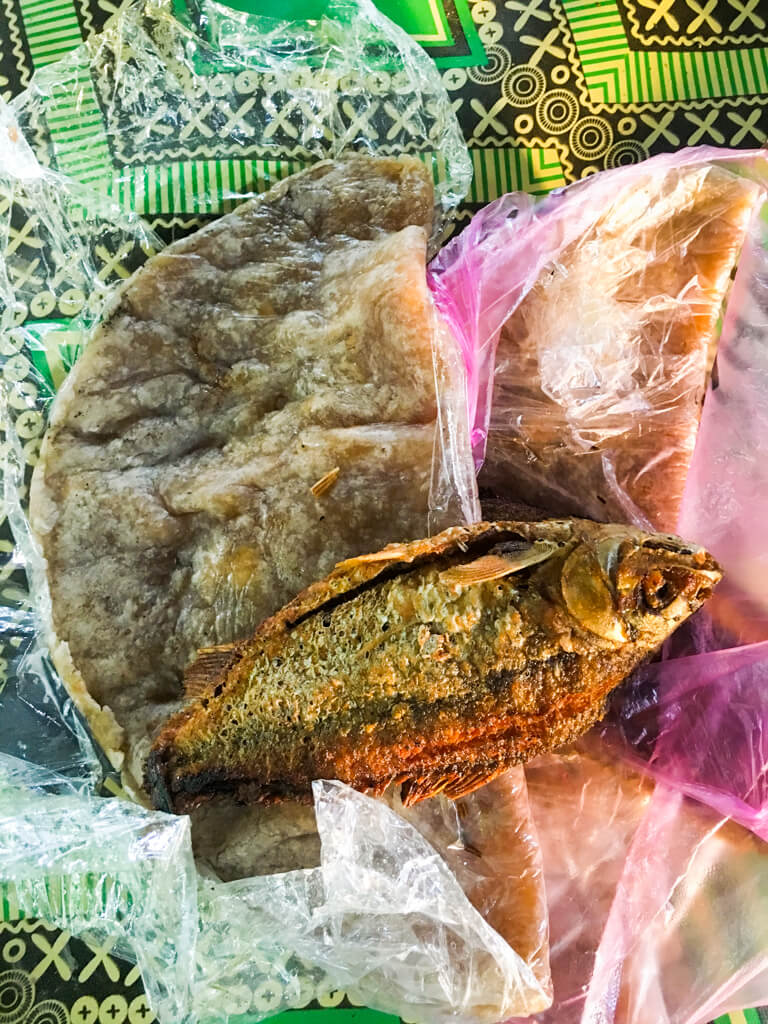
A Papuan New Guinean fish supper with fried sago.
There were two boxes of live sago grubs and some fried ones. I think I’m quite adventurous with food, but even I wasn’t ready to eat a live one, so I opted for fried. I tried to bite a piece off of it, but it was too elastic, so I put the whole thing in my mouth and chewed. Liquid gushed filled my mouth as its body burst open. It had a rather odd taste, although not unpleasant. The seller asked me if I wanted another four to make my purchase up to the 1 kina I had given her, but I said no, I’d like my change please. It was interesting, but I wasn’t in a hurry to eat more! I also bought the cheapest (and one of the sweetest) coconut I’ve had in all my travels in South and East Asia. It was 70 toea (100 toea make up 1 kina) or €0.17/$0.20, even cheaper than Sri Lanka. The economy is interesting here. Things that are produced locally are ridiculously cheap, while others, such as transport and accommodation, are more expensive than in Europe.
Not long after we got back to the house, there was a lot of shouting from the street outside. The three of us peered through gaps in the metal fence and watched from a safe distance. A couple of drunken young men were having an argument and there was a lot of shouting and screaming. This went on for a couple of minutes, until the man who was making most of the noise suddenly drew a 3ft blade. It was so long that it was more of a sword than a machete. The other man wasted no time and was soon fleeing down the road with the knife wielder in hot pursuit, waving his blade in the air. There was a lot more shouting for about 15 minutes and eventually the street fell silent.
I decided to leave Wewak for the safer town of Maprik a couple of hours drive away the next morning. That night, I was sitting on the balcony when Adrian came to find me and gave me a crocodile’s tooth on a string as a souvenir. I accepted – as he comes from a village by the Sepik river and his family own a crocodile farm, I didn’t think that the gift would be a big deal. Then after babbling on about how special I was again, he asked me if the house owner had talked to me about paying for my lodging, and how important it was not to offend him, otherwise I might not be invited back. This was honestly none of his business, and I said very firmly that the owner is a friend of a friend and that I was staying there as his guest. No payment was expected. After he babbled on a bit more, I told Adrian very directly that I am no different from him, we are both staying there as the owner’s guests, and that he’s the only one who treats me any different from anyone else. He eventually dropped the subject, but I’m pretty sure he was hoping I would offer some money to pay for the lodging or him going into town with me (despite that I paid for the bus and his food and drink and he volunteered to come!). I’m also pretty sure that if I’d offered money for the lodging, it would never have reached the owner. I knew I didn’t like or trust the guy from the moment we first met, and I was not wrong.
The next morning, I got up early, crept downstairs and washed as quietly as I could so as not to wake Adrian. I wrote a note for him on the cardboard box that the toothpaste I’d bought the previous day had come in thanking him for his company and let myself out of the compound. Fortunately, the gate was still not locked.
I walked back to the bus stop where I’d taken the bus with him the night before. Many of the bus drivers are highly religious and consider Saturday to be the Sabbath and don’t work, so there were nowhere near enough public minibuses for all the passengers trying to get into the town centre, especially as it was raining. While I waited, I chatted with a couple of older men, who kindly shared their umbrella with me, and then met a security guard from a company called Guard Dog Security, which is quite big in Papua New Guinea (with the security situation there, the market for security guards and services is huge).
After a twenty minute wait, during which every minibus that arrived was already full, the Guard Dog Security van arrived to pick up my new friend and he kindly offered to give me a lift. I soon realised that being a security guard is considered a good job in Papua New Guinea. The man was only 25, but eager to show off his good fortune and status. “I have two wifes,” he proudly informed me, grinning, “and at night we all sleep in the same bed.” “What does the church think of it?”, I asked curiously. I’d never met a Christian with multiple wives here, and PNG is VERY Christian. “Oh, they told me that I haven’t found the path of God, because otherwise I would not do this, but that’s about it”, he said ambivalently. When I commented that just having one girlfriend had caused me enough drama in the past he laughed and agreed, “That is the problem. They fight sometimes, so I am very careful to treat them both equally. If I give 100 kina to one. I must give exactly the same amount to the other.” Good luck to the guy!
When we arrived in Wewak, the security guard insisted on walking with me to the bus stop where the minibuses leave for Maprik and wouldn’t leave until he saw that I was safely on the right bus. Local people in Papua New Guinea are very protective of foreigners and, although I was quite capable of managing it myself, I was touched by his concern.
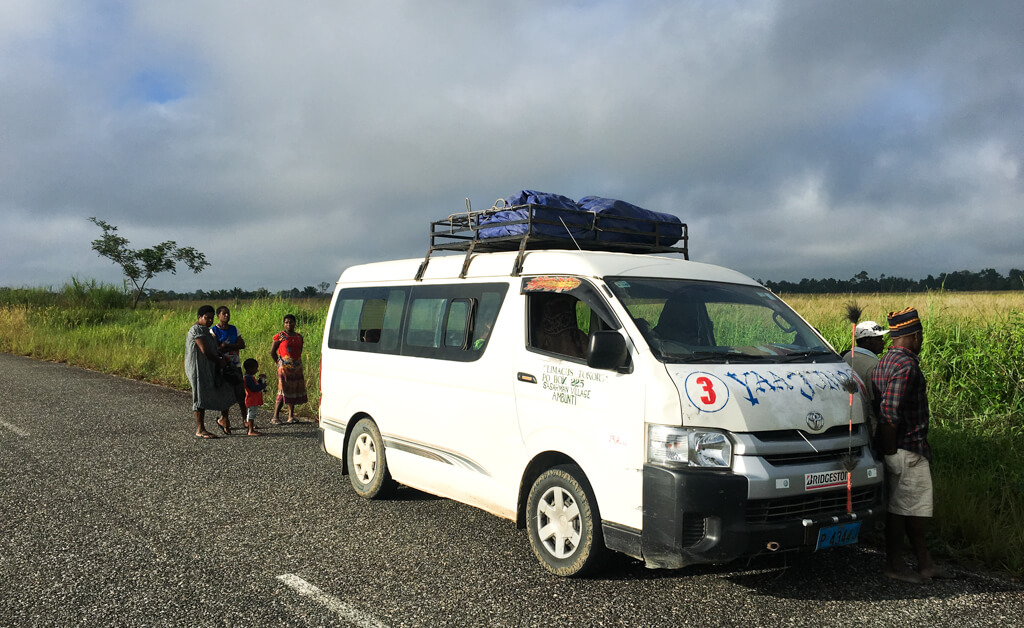
An actual minibus! The road from Wewak to Maprik was surprisingly good.
The journey from Aitape to Wewak was definitely the scariest part of my time in Papua New Guinea, not because of what happened, but because of what could have happened. It’s very difficult to judge the probability of being a victim of serious violence when visiting a country like Papua New Guinea and, as I travel solo, I am of course more vulnerable than travellers who are part of an organised tour group. Most of the people I met along the way were great though and one of the advantages of travelling solo is that it’s so easy to meet so many wonderful local people, so I wouldn’t have it any other way.
Useful Tips
- A lot of vehicles travel along the road from Aitape to Wewak each day and most journeys are trouble free. Even if your vehicle does get held up, if you do as the bandits say and give them your possessions, the chances are that they will not harm you. The period just before Christmas is the most dangerous, as villagers need money to celebrate the festive season.
- If you get to know some local people that you trust, ask them to help you find a reliable driver (who will not call ahead to tell the bandits that a rich foreigner is coming!).
- Some articles online say that it’s possible to take the boat from Vanimo to Aitape and then a PMV from Aitape to Wewak in one day. If you leave really early and are lucky with the timings, this might be possible, but I heard far more stories of travellers getting stuck in Aitape overnight, so don’t count on this.

Recent Comments